
by kathilipp | Aug 22, 2017 | Clutter Free, Clutter Free Podcast, Podcast |
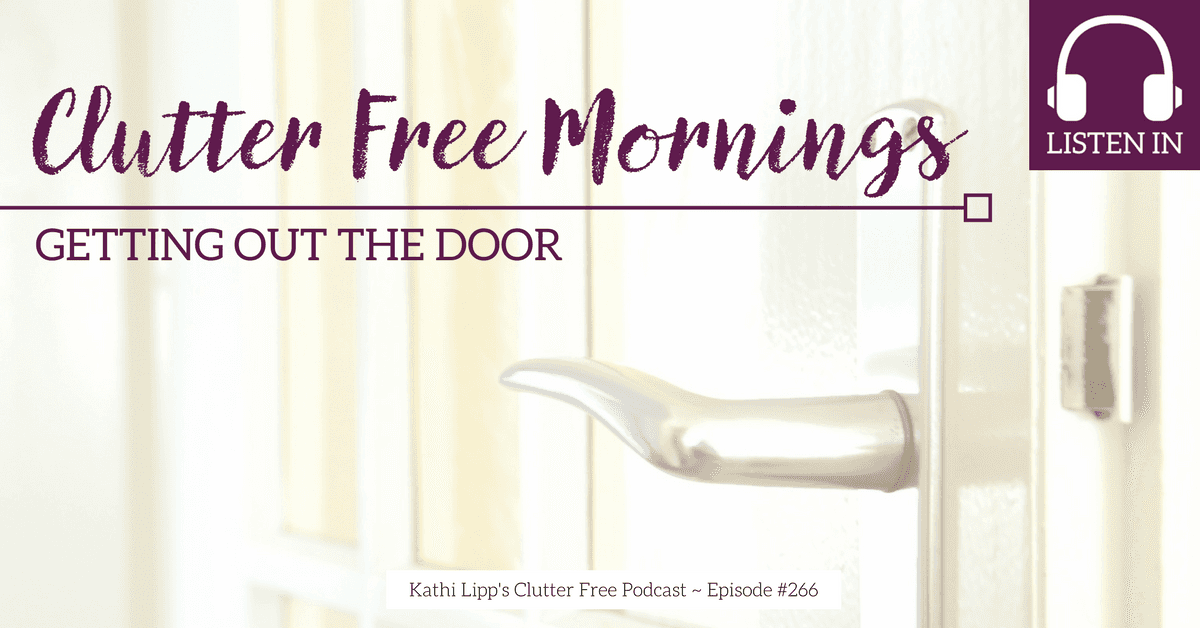

Overwhelmed

Getting out the door in the morning can be overwhelming. Kathi’s book, “Overwhelmed” helps to bring clarity and relief to our routines and our life.
Chock-full of tips to help us survive in the rugged terrain of the dogged morning routine, Author, Speaker and Clutter-Free guru Kathi Lipp guides us with many failproof strategies to get out the door with a smile on our face. And, yes, we can get up and going even with kids. Links to the resources Kathi uses are in the podcast post on our website. Listen in today and comment to be entered for a free giveaway of the book, “Overwhelmed”. In the words of Kathi, “Be the wise woman who gets focused and gets out the door in a powerful way each and every day.”
***GIVEAWAY: What is your best “get out the door” tactic?
Comment on the podcast page and one commenter will win a copy of my book Overwhelmed.***

by kathilipp | Aug 15, 2017 | Clutter Free, Home, Podcast |
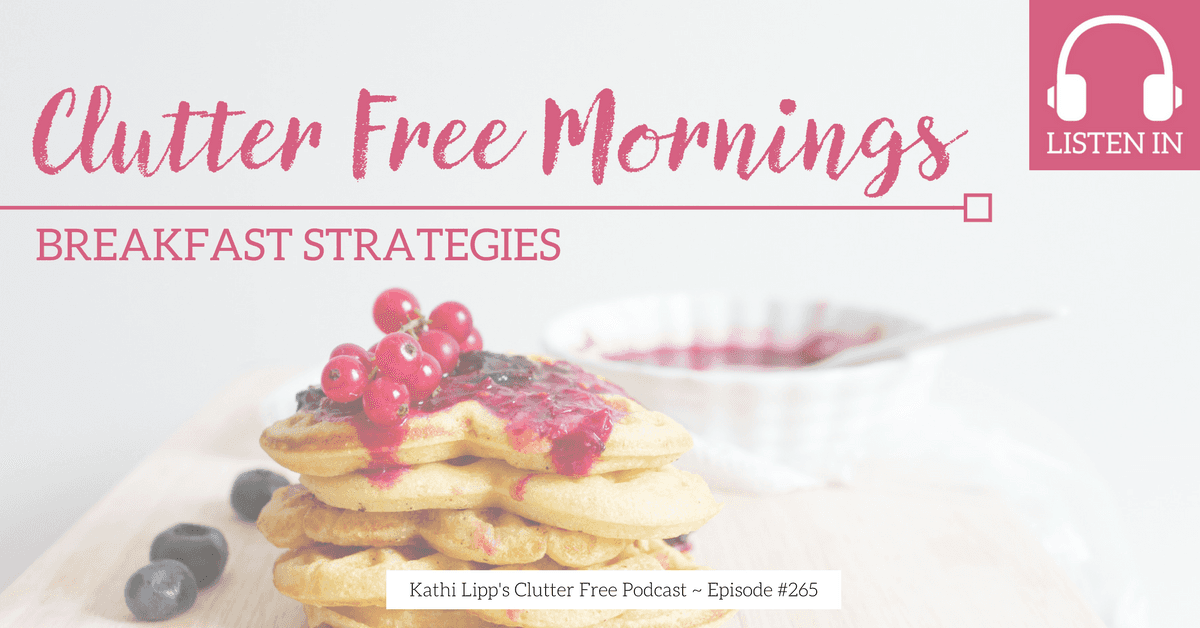
Clutter Free: Quick and Easy Steps to Simplifying Your Space
Tired of a mess causing you stress? Clutter has a way of affecting us on many levels. Get control of your space again and de-clutter your life with Kathi Lipp’s book, “Clutter Free: Quick and Easy Steps to Simplifying Your Space”.
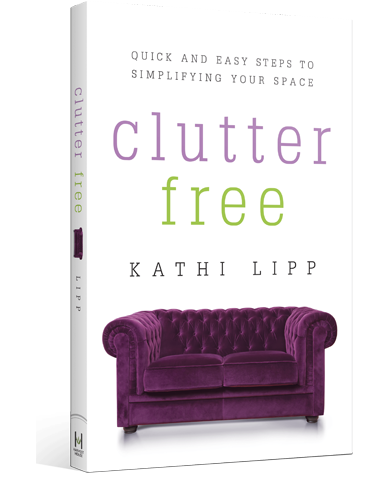 Ever feel like you will never get a handle on your breakfast routine? Kathi Lipp guides us in this episode to developing strategies with several practical tips that will help you to eat healthier and be less stressed for breakfast.
Ever feel like you will never get a handle on your breakfast routine? Kathi Lipp guides us in this episode to developing strategies with several practical tips that will help you to eat healthier and be less stressed for breakfast.
Get unstuck with a variety of different tools to aid in easier cooking, recipe ideas, prep ideas for ahead of time, and storage ideas that Kathi shares to take the hassle out of breakfast. Come on in and get your breakfast time rejuvenated!
?
FREE DOWNLOAD
*Bonus: GET A FREE DOWNLOAD of 30 breakfast ideas from Kathi!*

by kathilipp | Aug 10, 2017 | Clutter Free, Overwhelmed |

I love me some Facebook Live…
As often as I can, I jump onto my Facebook page on Wednesday mornings and talk about Clutter, Overwhelm and how to get out from under both. But last week, I had a special guest at my house, my coauthor Cheri Gregory! She put me on the hot seat and asked me all sorts of questions that readers submitted about one of the most dreaded words I speak about: Routines.
On the video, Cheri and I answer questions like:
Were you this organized when you had littles at home? What practical tips do you have for moms in the “littles” stage?
How do you manage and remember your routines?
When the unexpected happens, emergencies arise, how do you stop the panic attacks that arise when you get put out of your routine???
How did we get over that all or nothing notion? I’m a perfectionist when it comes to routine, therefore I refuse to do one because I’m so afraid there will be a flux that changes everything and spins the rest of my plan out ofa control!! #perfectionistissues
It’s a great conversation. And, if you watch, you may see me lose my mind when a squirrel invades my garden and steals one of my prized tomatoes… (I, apparently, was not at my best…)

by kathilipp | Aug 7, 2017 | Clutter Free, Finances |

My friend Kevin’s mom was famous for explaining away any purchase she wanted to make by saying, “But, it on SALEEEEEE…”
For most of my life, I was just like Kevin’s mom. If there was a deal to be had, that was all the justification I needed to make the purchase.
Cheap goods are never without a cost.
As I’ve gone deeper into my Clutter Free life, I’ve come to understand a core truth: Cheap goods are never without a cost.
1. Cheap goods cost us space.
Cheap goods we don’t need but justify because they are on sale (or already cheap), take up room in our houses. We need a way to store these things on top of the other things we’re already keeping.
2. Cheap goods cost us time.
If clutter is a problem, then the minutes every day you spend looking for lost items, moving stacks, and dealing with clutter are slowly chipping away at your life.
3. Cheap goods cost us money.
A dollar here and there adds up. I’ve noticed a correlation between those who struggle with clutter and those who struggle with spending. We stockpile things we think we’ll need in the future, while not stockpiling what we will really need—money.
4. Cheap goods cost us our integrity.
Many of those cheap goods are produced on the backs of others—slave and child labor in foreign countries. Since I’ve stopped buying lots of clothes (I’ve bought five items in 2017,) I’ve been able to buy better quality items I know aren’t made with slave or child labor. As a practicing Christian, I need to be aware that I may have slaves working for me, even if they are half a world away. What is my moral obligation?
As I go deeper into my Clutter Free journey, these are the things I need to consider.
I’m not saying that bargain shopping is bad. Quite the opposite. The biggest bargain is not buying things you don’t need.
Break the Cheap Goods Habit
So if you’ve developed an addiction to cheap goods, how do you go about breaking it?
1. Shop with a list.
Always know what you’re going into the store for, and come out with just that. When Roger and I go shopping at Costco, we have a massive list. (We only go once a month and buy most of our food there.) At Costco, we do allow ourselves one indulgence, usually through the samples that are pushed like drug dealers.This month it was the prepared chicken salad. Oy. Vey.
The list rule applies for Target, Best Buy, Bed Bath and Beyond, or any other store we might be tempted. Bring a list. Stick to the list.
2.Stay Accountable.
If you know you struggle with sticking to your needs, ask a friend (or the Clutter Free group) to keep you accountable. It’s so much easier to resist temptation if you know someone is going to be checking up on you.
3. Budget.
If you’re saving up for something bigger and better, it’s easier to say no to the nonsense. We use the You Need A Budget (YNAB) app and love it. We remind ourselves that we can have anything we want, as long as we budget for it.
4. Realize it’s OK to have nice things.
We didn’t bring home any souvenirs from our recent vacation except books, a nice shirt for Roger, and one thing for me. In a little shop in Victoria, there was a woman selling handmade soaps. I found an orange and ginger soap that smelled like heaven. I fell in love.
Normally, I’m a basic soap girl. We have a large container of Soft Soap that we use to refill all the soap dispensers in the house. Cheap and easy. But I realized a few things:
*I loved this soap and would enjoy it while it lasted.
*I was supporting another woman’s livelihood.
*It isn’t clutter. When it’s used, it’s gone.
I bought the soap.
I love the soap. Guess what, I use the soap. And I don’t feel guilty about the price tag because that little piece of soap lines up with my Clutter Free values. And that? Is worth every penny.

by kathilipp | Aug 1, 2017 | Clutter Free, Podcast, tips and ideas |


Get Yourself Organized & Put the Disciple into Discipline
The Get Yourself Organized Project
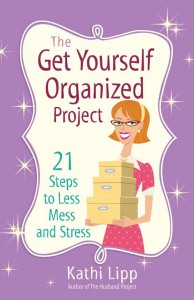 Kathi Lipp, author of The Husband Project and other “project” books, is just the author to address this need. In her inimitable style, she offers:
Kathi Lipp, author of The Husband Project and other “project” books, is just the author to address this need. In her inimitable style, she offers:
- easy and effective ways women can restore peace to their everyday lives
- simpleL and manageable long-term solutions for organizing any room in one’s home (and keeping it that way)
- a realistic way to de-stress a busy schedule
- strategies for efficient shopping, meal preparation, cleaning, and more
Full of helpful tips and abundant good humor, The Get Yourself Organized Project is for those who want to spend their time living and enjoying life rather than organizing their sock drawer.
LEARN MORE
Put the Disciple into Discipline
 PUT THE DISCIPLE INTO DISCIPLINE gives parents the tools they need to truly disciple their kids through their most trying discipline situations.
PUT THE DISCIPLE INTO DISCIPLINE gives parents the tools they need to truly disciple their kids through their most trying discipline situations.
What do you say when your kid has really messed up?
How do you respond when your three-year-old is throwing pennies at other carts as you walk through the aisles at Target? Or when your eight-year-old daughter rolls her eyes in a dramatic fit of preteen angst? Or when your sixteen-year-old son is lying as he attempts to go somewhere that he never should be?
These are the tough moments in parenting.
But they are also the moments that will define your kids.
LEARN MORE
Do you have a morning routine that works for you? Kathi and Erin discuss how to have a clutter free morning and give you three strategies to make mornings much easier.
Implement these tips now to start the new school year stress-free.
As promised, a pick of Erin’s wall charger:

Erin MacPherson lives in Austin, Texas with her husband Cameron, her sons Joey and Will and her daughter Kate. She is the author of “The Christian Mama’s Guide Series“, a staff writer for Dun & Bradstreet and a freelancer for publications like Thriving Family Magazine, MOPS MomSense, FamilyLife Magazine, Daily Guideposts and BEMag. She blogs about her life, her kids and her faith at ChristianMamasGuide.com.
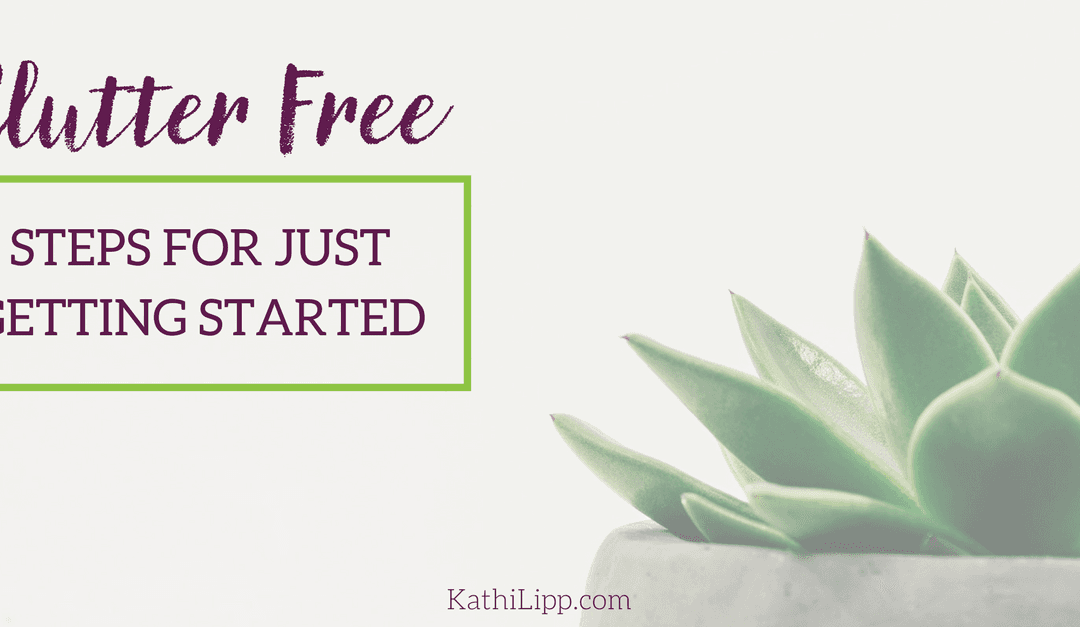
by kathilipp | Jul 27, 2017 | Clutter Free, tips and ideas |

Since starting Clutter Free Academy, we’ve had many people ask, “Where do I start?”
If you’re part of our Clutter Free Academy group or on your own, here is a beginners’ guide for those looking to jump in and get results quickly:
(This system is based on my book Clutter Free: Quick and Easy Steps for Simplifying Your Space. The entire program is in there, but this will get you started while you order the book on Amazon or wait for it at the library!)
1. Pick a major source of pain. Get mad every time you go into the garage? See red when you try to relax in the living room? Is your office where papers go to die? Whatever area of your home is causing you the most pain, that’s what needs to be addressed first.
2. Start with surfaces. Some people want to dive into grandma’s photo albums that have been sitting in the attic for decades. But I would encourage you to give yourself a goal (Twenty items a day? Thirty?) and deal with the layers. Start with surfaces that are confronting you every day: Your nightstand, kitchen counters, kitchen table, desk. As you get practice with the day to day clutter, you can start to deal with the deeper clutter. You are building your “flinging” muscles!Oh – and when you start – only pick a small area. One counter, one shelf, one drawer. (I know that’s not a surface, but if it’s a drawer you use all the time and it’s so stuffed you can’t open it, and bad words come to mind every time you try, feel free to tackle that drawer.) To stay focused, you can even use blue painter’s tape to put physical boundaries on the area you are working on. This is great for young kids or easily distracted adults.
3. Set up a donation space. I have a bin in my garage where all my donations go. When it’s filled up, I take it to the car and stop at the “donation station” on the way to church on Tuesdays for a meeting. For the first few weeks of flinging, you may have more garbage and recycling than normal. That’s OK! Understand that you may have to pay for past clutter indiscretions, but going forward, you will remember the cost of bringing clutter across the threshold and will resist the urge.
4. Get your tools together. You will need three bags or boxes to sort out your stuff. Label the containers: Other Rooms, Put Away (anything that belongs in that room, but is out of place), and Give Away. We have nifty color-coded bags with handles that are easy to use. You will also need a recycling bag and a garbage bag.
5. Declutter. Get all your containers and bags around you so it’s easy to sort out your area. Set a timer for 15 minutes and start sorting.
6. Deal with the fallout. At the end of the 15 minutes, it’s time to start dealing with the stuff you are not putting back onto/into that same space. Set your timer for 5 minutes and take care of any container or bag that is full (or close to full). If that is all the decluttering you are doing for now, deal with all the containers/bags. Don’t leave a bigger mess than when you started!
7. Stay encouraged with other flingers. You’ll need a cheering section, especially when you’re getting started or “leveling up” (dealing with harder clutter: sentimental things, family items, expensive clothes, etc.). Connect with people who have made the same hard decisions and know your pain. We have a whole Facebook group dedicated to learning the Clutter Free way.
Join us over there for encouragement and motivation. Miracles are happening in that group. Go be a part of it!


















